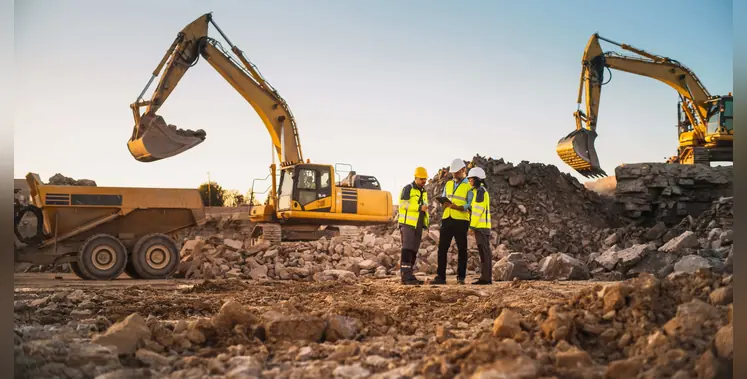Construction
Prinoth unveils flagship Panther T23r at CONEXPO-CON/AGG 2026
Prinoth has officially launched its new flagship Panther T23r, describing it as the largest and most advanced rotating crawler carrier in the industry. The debut took place during a press conference at Conexpo-Conagg 2026
The Panther T23r is the first machine to incorporate Prinoth’s newly developed PowerForce undercarriage, an innovation that forms the basis of more than 20 patent applications. The system is engineered to significantly enhance terrain capability, operational efficiency and overall machine performance.
With a payload capacity of 22.5 short tons, the T23r combines high carrying capacity with relatively compact dimensions. The unit measures 9.8 feet wide, 10.8 feet tall and has a total weight of 40 tons. Its 360 degree continuous rotating upper structure, paired with a rounded Hardox steel dump box and telescopic cylinder, allows for precise material placement in confined or restricted worksites where traditional haulers may struggle to operate.
At the core of the machine’s performance is the PowerForce undercarriage. Unlike conventional rigid walking beam systems that transmit terrain shocks directly to the operator and payload, the new design absorbs ground irregularities while optimising power transfer. This enables improved travel speeds, reduced fuel consumption and greater operator comfort.
The Adaptive Independent Suspension System positions eight wheels on individual arms, each offering seven inches of travel supported by hydro-pneumatic shock absorbers. These automatically adapt to load variations, maintaining consistent ride quality whether the carrier is operating empty at 41,200 pounds or fully loaded at 85,400 pounds. 60% of the load is strategically distributed to the centre wheels, enhancing zero-turn manoeuvrability and lowering ground pressure.
Engineers have also introduced an oblong, oval-shaped track configuration that reduces bend points by 50% and doubles the bend radius compared to traditional systems. This approach minimises energy loss during each track cycle, ensuring more engine output is translated into forward motion. The expanded ground contact area further improves flotation in soft terrain and traction on inclines.
Precision track alignment is another defining feature, with pitch accuracy said to be ten times greater than standard crawler carriers. The system incorporates precise link spacing and an auto-centering “fox head” profile, enabling planetary drives to engage 15 teeth simultaneously instead of relying on single-point contact. The combined roller and wheel arrangement is designed to virtually eliminate de-tracking during demanding manoeuvres, reducing downtime and extending track life.
The undercarriage also benefits from an automatic dual-action tensioning system that continuously adjusts track tension according to operating conditions. When lightly loaded, tension is reduced to limit wear. Under heavier loads or when greater traction is required, tension increases automatically. This real-time adjustment is intended to maximise performance while prolonging service life.
The Panther T23r’s dump box has been redesigned with a rounded, deep-section Hardox steel profile to support smoother material discharge and minimise carryback, particularly when handling sticky soils or aggregates. The box has been repositioned closer to the undercarriage centreline, improving centre of gravity and balancing loads across the suspension and central bearing. This refinement helps lower structural stress and overall frame complexity.
The machine is equipped with a newly designed cab featuring a near centre-mounted operator seat for improved visibility, especially to the right side where ground crews typically operate. Standard features include an air-ride seat, 7 inch touchscreen display, ergonomic joystick controls for dumping and rotation, intuitive steering wheel and foot throttle system, sun visor and cruise control to reduce fatigue over long shifts. An optional buddy seat is available.
“Customers are pushing farther into remote, sensitive and high-consequence environments,” said Frank M Gangi, product manager for the Prinoth Panther. “With the Panther T23r, we set out to give them a machine that feels completely in control on those sites, with a payload and undercarriage that lets them haul more in fewer passes while protecting the jobsite and the machine.”
A public unveiling ceremony will take place on Tuesday, March 3 at 4:30 PM PST at the Prinoth booth #W43845 in the West Hall of the Las Vegas Convention Center. The Panther T23r will remain on display at the booth from March 3 to 7.
Michelin launches XHA3 earthmover tyre at CONEXPO-CON/AGG 2026
At ConExpo 2026, Michelin North America, Inc. unveiled its latest earthmover tyre, the Michelin XHA3, positioning it as the next step forward in loader and grader tyre performance
Developed as the successor to the well-established Michelin XHA2, the new XHA3 is engineered to meet the increasing demands of modern construction equipment, offering higher load capacity, improved ton-per-hour (TKPH) capability and a redesigned tread pattern tailored for today’s heavier, more productive machines.
“With the Michelin XHA3 tire, we’re building on a heritage our customers trust while delivering the next level of performance they demand,” said Yahn Heurlin, vice-president of Marketing, Michelin North America.
“Construction equipment continues to evolve with higher loads, longer duty cycles and greater productivity expectations. The XHA3 tire, is designed to help fleets unlock more ton-per-hour performance, carry heavier loads with confidence and extend tire life, all while reducing total cost of ownership.”
The XHA3 replaces several previous product lines, including the XHA2, XADN+, XAD65 and XLD, representing Michelin’s most substantial advancement in this category in over ten years. The consolidation reflects a strategic move to deliver a single, more capable solution for a wide range of loader and grader applications.
Designed specifically for the operational realities of contemporary construction fleets, the XHA3 focuses on measurable gains in productivity while safeguarding long-term equipment value. By integrating the proven foundation of the XHA2 with next-generation structural and tread enhancements, Michelin aims to provide operators with a tyre that supports heavier loads, extended duty cycles and greater overall efficiency on site.
The new tread design has been developed to enhance durability and performance under demanding conditions, aligning with evolving fleet requirements for higher output and reliability. At the same time, the increased TKPH capability allows machines to operate more effectively in high-intensity environments without compromising tyre life.
With the launch of the Michelin XHA3 at CONEXPO-CON/AGG 2026, Michelin underscores its continued focus on innovation and performance-driven solutions for the construction industry. The company states that the new tyre is built to help customers move more material, operate more efficiently and strengthen profitability across their operations.
Dangote seals XCMG refinery, infrastructure pact
Dangote Group has signed a US$400mn equipment deal with China's Xuzhou Construction Machinery Group (XCMG) to accelerate the expansion of its Nigerian oil refinery
The goal is to expand output at the refinery, which now plays an integral part in meeting Nigeria’s domestic fuel needs, to 1.4 million barrels per day (bpd).
The strategic agreement is also aimed at strengthening infrastructure delivery, industrial capacity and green project development across other projects in Africa in refining and petrochemicals, as well as agriculture and infrastructure.
“Under the agreement, the two companies will collaborate across multiple sectors including mining, petrochemicals, building materials, agriculture and infrastructure construction, leveraging their respective strengths to pursue joint growth and long-term value creation,”a Dangote statement read.
Dangote Group, Africa’s largest diversified industrial conglomerate, operates across cement manufacturing, petrochemicals, fertiliser, agriculture, food processing, mining, ports and logistics in Nigeria and several other African countries.
The group is currently accelerating capacity expansion and regional market development as part of its strategic ambition to reach US$100bn in scale by 2030.
As part of the collaboration, XCMG will support Dangote through its established African sales and service network, while also facilitating visits by Dangote personnel to China and providing logistical assistance.
XCMG will also deploy dedicated project teams to develop integrated equipment and service solutions for Dangote projects, particularly in open pit mining, petrochemicals, building materials and agricultural processing.
“The deal reflects Dangote Group’s broader push to deepen industrial capacity across Africa through strategic global partnerships, while aligning with XCMG’s ambition to expand its footprint and service offering on the continent,” the Dangote statement noted.
In an XCMG statement, Aliko Dangote, president and CEO of Dangote Group, remarked that XCMG’s manufacturing capabilities were impressive and had strengthened his confidence in jointly advancing Africa’s green industrial development.
Dangote visited China recently to meet Yang Dongsheng, chairman of XCMG, and other senior executives.
He “praised XCMG’s global strategy, intelligent manufacturing capabilities, product reliability, and full life-cycle service system, highlighting the company’s strengths in the international marketplace,” according to the XCMG statement.
Read more:
Dangote to build urea factory in Ethiopia
Babcock launches Volvo’s next-generation wheel loaders
Babcock has launched Volvo Construction Equipment’s latest generation of wheel loaders in South Africa, offering customers in construction, quarrying, mining, and material handling sectors enhanced productivity, fuel efficiency, and operator comfort
The new lineup includes the Volvo L150, L180, and L220, designed for demanding conditions while lowering total cost of ownership over the machine lifecycle.
Higher productivity on site
Volvo CE’s new wheel loaders feature advanced load-sensing hydraulics to boost attachment responsiveness and reduce cycle times. Auto Bucket Fill technology ensures faster, consistent bucket filling, while automatic bucket levelling improves accuracy and repeatability by returning the bucket to level from dump or curl modes.
The integrated Volvo powertrain synchronises the engine, transmission, and axles for maximum efficiency. OptiShift technology and Volvo’s patented Reverse-By-Braking (RBB) system help shorten cycle times, cut fuel consumption, and reduce drivetrain wear during repetitive loading.
All models are compatible with HVO (Hydro-treated Vegetable Oil) fuel, supporting decarbonisation goals without engine modifications.
Operator comfort upgraded
The redesigned cab prioritises visibility, ergonomics, and ease of use. The Volvo Co-Pilot interface allows operators to control machine functions, productivity tools, and comfort settings on a single display, with up to four widgets viewable simultaneously.
Additional enhancements include improved armrests, extra storage, multiple USB charging points, better climate control, and a choice of seating including heated and ventilated options. Optional Comfort Drive Control (CDC) enables single-lever steering to reduce operator fatigue during long shifts.
Safety and service made easier
Service access has been simplified with a tiltable cab and a new service platform with harness anchor points, making routine maintenance safer. Under-grille lighting improves visibility during refuelling in low-light conditions.
Safety is strengthened with Volvo Smart View 360-degree visibility, an upgraded Collision Mitigation System, high-visibility lighting, automatic door opening, and robust handrails for safer operation on busy sites.
Digital tools for smarter fleets
Volvo’s digital solutions further improve efficiency. Load Assist provides on-board weighing and operator coaching, Load Ticket enables smooth data transfer to the office for reporting and invoicing, and CareTrack telematics alongside Site Operations tools support fleet monitoring, optimisation, and mixed-fleet management.
Flexible financing options
Babcock also offers tailored funding through Volvo Financial Services, helping customers align equipment investment with operational needs and cash flow, allowing deployment of the latest technology while managing risk and costs.
Local support for long-term performance
“As the authorised Volvo Construction Equipment dealer in South Africa, Babcock is proud to introduce this new generation of wheel loaders to the local market,” said Quintin O’Reilly, Head of Sales - Equipment, Babcock.
“These machines deliver tangible gains in productivity, efficiency and operator comfort. When combined with Babcock’s national service footprint, parts availability and flexible financing options, they offer a compelling solution for customers focused on long-term performance and value.”


















